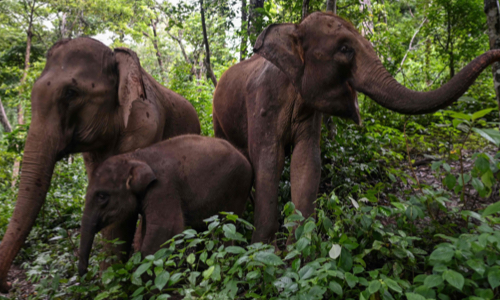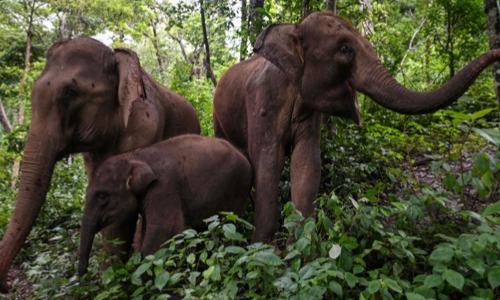Environmental institute's lawsuit against elephant performances in Yunnan rejected

Elephants wander in Yunnan Province. File photo: VCG
On Tuesday, Kunming Railway Transportation Intermediate Court delivered the first-instance public verdict on the ecological damage civil public interest lawsuit filed by an environmental research institute in Beijing against a company in Southwest China, Yunnan Province about elephant performances. The plaintiff's case was rejected.
The plaintiff, Duoyuan Zhineng Environmental Research Institute in Changping District, Beijing, established on February 4, 2015, is a privately run non-enterprise entity. The defendant, Xishuangbanna Wild Elephant Valley Scenic Area, registered on October 27, 2003, is a limited liability company with a business scope including the domestication, breeding, and performance of Asian elephants, and it has obtained permits for the domestication and breeding of Asian elephants.
The plaintiff filed the lawsuit alleging that the defendant's elephant performances constituted mistreatment of Asian elephants and damage to the natural ecosystem, and demanded that the defendant stop the performances and issue an apology.
After considering arguments from both sides, the court held that current laws and regulations do not prohibit public displays and performances by wildlife, and the permits and business licenses held by the defendant indicate that it is qualified to use elephants for performances, which is legal. Domestication and breeding refer to activities under human control for the purpose of protection, research, scientific experiments, exhibitions, and other economic objectives. Reasonable domestication is not mistreatment, the court said, and the elephant performances guided by staff do not cause physical harm to the elephants.
The plaintiff's view that "performance equates to mistreatment" is both contrary to current legal provisions and lacks factual basis. The elephants used for performances and the performance area are limited to the Wild Elephant Valley and are independent of the wild ecological environment, so there is no ecological damage or significant risk to the legal rights of the public, the court said.
The judgment also noted that moderate human-elephant interaction is both a way of inheriting traditional culture in specific regions and can enhance people's understanding of elephants and foster their awareness of elephant protection. Although the plaintiff's claim about environmental civil public interest infringement by the defendant was not upheld, the wide public interest in the case shows that the concept of animal protection is continuously evolving.
The 'Wildlife Protection Law of the People's Republic of China' allows wildlife performances while also emphasizing that wildlife must not be mistreated. Concurrently, with the advancement of human civilization and scientific technology, it is necessary to pay more attention to animal protection and adopt more civilized concepts and methods in animal domestication. Only when humans and animals coexist harmoniously will the world be more splendid and peaceful.



